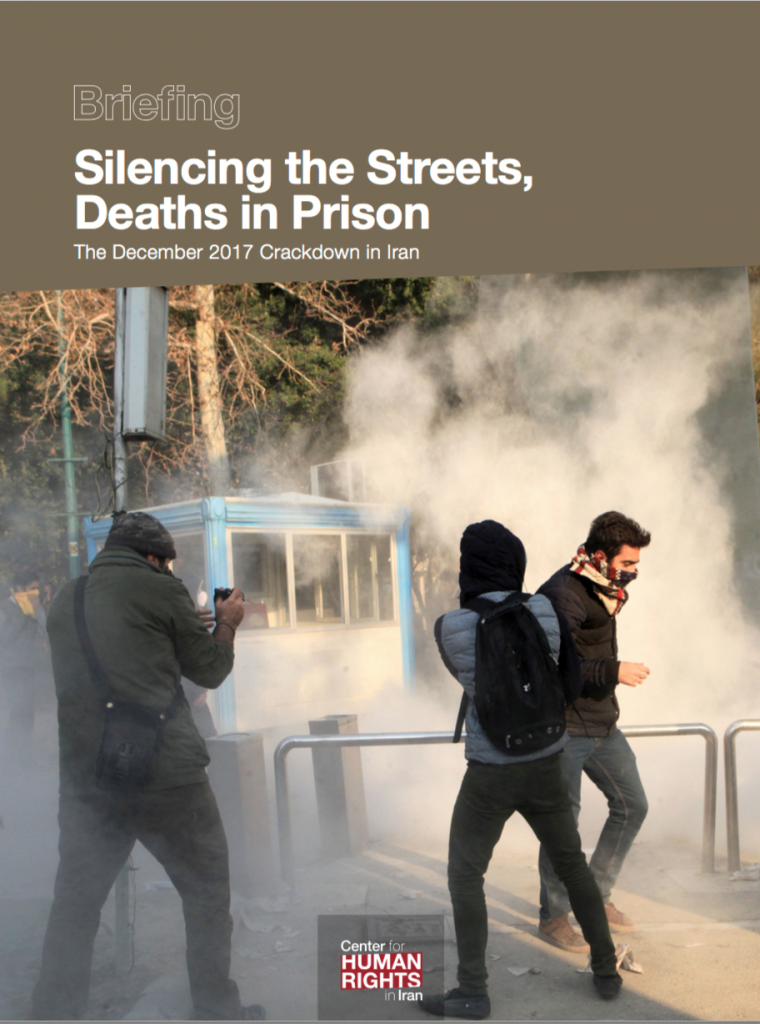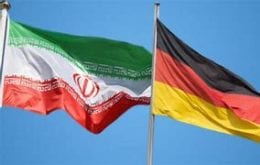CHRI – UN Press Release, – UN human rights experts* today called on the Iranian authorities to release all individuals arbitrarily detained and mistreated during recent protests, and expressed concerns over the hundreds of people who have been killed.
“We are shocked at reports of the ill-treatment of those detained during the protests that took place in November 2019, and deeply disturbed that the reported use of excessive force by the Iranian security forces led to an untold number of casualties, including deaths,” the experts said.
“Reports suggest that detainees are being tortured or are suffering other forms of ill-treatment, sometimes to extract forced confessions. Some are also reportedly being denied medical treatment, including for injuries caused by the security forces’ use of excessive force, and are being held in overcrowded detention centres. Some are being held incommunicado or subjected to enforced disappearances.”

Download “Silencing the Streets, Deaths in Prison: The December 2017 Crackdown in Iran” for more information about detainees’ due process rights.
Up to 200,000 people took part in protests after the Iranian Government announced a new fuel policy. Official sources state that at least 7,000 protesters were arrested, thousands of whom are still in detention.
The experts also fear that detainees will be denied the right to a fair trial because of Iran’s failure to adhere to due process standards, especially for those who have voiced opposition to the Government.
“Senior officials have said that protesters will face severe punishment,” the experts said. “We have already seen Iranian state television broadcast so-called ‘confessions’, despite claims that these are being obtained under duress. Many detainees are also reportedly being denied the right to a lawyer of their choosing.
“We urge the Government and the judiciary to ensure that all those accused of crimes go through court proceedings that adhere to international fair trial standards, including the presumption of innocence.”
According to credible sources, at least 304 people, including 12 children, are confirmed to have died, with unconfirmed reports indicating that the total could be more than 400. The number of deaths appears to be particularly high in some provinces with large ethnic minority populations, the experts added.
“Reports and footage indicate that Iranian security forces not only fired live ammunition at unarmed protesters, but also aimed at their heads and vital organs,” the experts said.
“Targeting these parts of the body shows that the security forces were aiming to kill or at least cause serious injury. The Governor of Quds City has herself admitted publicly that she ordered security forces to shoot protesters who entered the governor’s building.
“We are extremely disturbed that the Iranian authorities would use such tactics against peaceful protesters exercising their rights to freedom of expression, association and assembly, in breach of international standards on the use of force.”
While noting that the internet shutdown had eased, the experts said they were still concerned about ongoing suppression of the right to freedom of expression.
“Most disturbingly, the families of individuals killed by security forces have allegedly been threatened not to speak out. Iranian journalists have been ordered not to criticise the government response, while the relatives of journalists working for Farsi-language news outlets abroad are being pressured in an effort to silence their reporting.”
The experts echoed the call by the UN High Commissioner for Human Rights, Michelle Bachelet, for the Government to hold prompt, independent and impartial investigations into all allegations of human rights violations, including the deaths of protesters.
The UN experts have previously raised their concerns with the government and will continue to seek to engage in dialogue on these issues and monitor the situation.
(*)The UN experts: Mr. Javaid Rehman, Special Rapporteur on the situation of human rights in the Islamic Republic of Iran; Mr. Clement Nyaletsossi Voule, Special Rapporteur on the right to peaceful assembly and association; Mr. David Kaye, Special Rapporteur on the promotion and protection of the right to freedom of opinion and expression; Ms Agnes Callamard, Special Rapporteur on extrajudicial, summary or arbitrary executions; Mr. Nils Melzer, Special Rapporteur on torture and other cruel, inhuman or degrading treatment or punishment; Mr. Michel Forst, Special Rapporteur on the situation of human rights defenders; Mr Diego García-Sayán, Special Rapporteur on the independence of judges and lawyers; members of the UN Working Group on Arbitrary Detention – Mr. José Antonio Guevara Bermúdez (Chair), Ms. Leigh Toomey (Vice-Chair on Communications), Ms. Elina Steinerte (Vice-Chair on Follow-up), Mr. Seong-Phil Hong and Mr. Sètondji Adjovi; and the Working Group on Enforced or Involuntary Disappearances, comprising Mr. Luciano Hazan (Chair-Rapporteur), Mr. Tae-Ung Baik (Vice-Chair), Ms Houria Es-Slami, Mr. Bernard Duhaime and Mr. Henrikas Mickevicius.
 Shabtabnews In this dark night, I have lost my way – Arise from a corner, oh you the star of guidance.
Shabtabnews In this dark night, I have lost my way – Arise from a corner, oh you the star of guidance.


